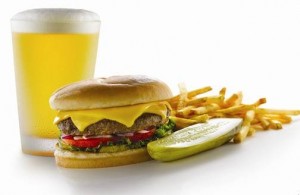OPINION: A tale of two hospitality laws
In Edmonton, it is now illegal to drive a vehicle with a blood alcohol content of .05.
As of this year, it is also illegal in Edmonton to drive while eating a sandwich.
One of these laws has science and some common sense behind it. The other doesn’t.
Can you guess which is which?
This should be a pretty easy quiz. After all, plenty of us are honest enough to admit we’re immediately buzzed after one beer. And most of the us have never seen a horrific eight-car collision caused by McDonald’s Chicken McNugget consumption.
But to listen to the tenor of public debate over the two laws, both of which broadly affect Edmonton’s entertainment and hospitality industries, you’d think the exact opposite were true.
To go by what the media says people are complaining about most, you’d think there were mass protests in the streets planned by casual drinkers … none of whom, presumably, ever munch on a burger in their car while in traffic, as no one gave a damn about that law passing.
The reality is, everyone begins being impaired at .02. Most show signs of severe impairment at .05. MADD — damn its members and their evil urge to stop their children from dying — bases its research on studies from the National Highway Traffic Safety Administration, the National Institute on Alcohol Abuse and Alcoholism, the American Medical Association and the National Commission Against Drunk Driving.
The most recent research shows that at .08 — the threshold in the federal Criminal Code — most people are more than 11 times more likely to have an accident than if driving sober. But because the science is now established, almost every province already sets the threshold for administrative suspensions to .05, including Alberta — and Saskatchewan’s is .04.
All this new law does is change the penalty (to one that is too onerous and has already been rejected in one court as such.) But at .05, police were already mandated by the Traffic Safety Act to issue a 24-hour suspension.
Telling that to casual drinkers who’ve never had an accident is fruitless: all they can hear is that they’re going to have to start paying for cabs if they want to go out. They don’t feel it affects their personal security, so to hell with everyone else. That’s human nature, unfortunately. We care about communities and their ideas when we feel a mutual sense of inclusion. If you truly don’t believe you’re impaired at .05, you probably a) don’t know when you hit .05 and b) aren’t likely to take the position of humility that you might be wrong.
This law is designed to take the guess work out of impairment by essentially making it illegal to have more than two drinks in a three-hour period and then drive. And yet, if you were to go by the reactions of some columnists and letter writers, that kind of preventive lawmaking is one step away from having an identity chip inserted under the skin by the government at birth.
What this demonstrates, clearly, isn’t that the public is outraged at Alison Redford for the new law, but that the mainstream media caters to the loudest defenders of ideological extremes — people who are most vehement because their ignorance makes them the most frightened, or people who stand to profit from that extreme.
It’s a guaranteed customer base that will never leave, because it’s based on human nature and our requirement for security in our beliefs. It exploits ignorance by making the ignorant believe they part of a move towards more individuality and self-reliance. When really, it’s just aimed at making drinkers more civil.
Compare that with the city’s distracted driving bylaw, which gives police the legal right to pull you over for any activity, basically, other than driving, talking on a hands-free phone and drinking a coffee.
That includes, for example, reaching over to the passenger seat with one hand to unwrap and eat a burger.
When it comes to flawed laws that utterly ignore human nature, the distracted driving law takes the cake — and it also impacts business, in that people will be less inclined to stop for a quick bite from a drive through while busy.
Why? Simple: distraction plays a tiny part in why people don’t drive well.
INATTENTION is not the same thing as distraction. Inattention can occur due to the natural process of driving — we become so accustomed to doing most of it automatically that we forget to concentrate on the things that require it, such as things happening outside the vehicle.
We pattern drive, even when the person ahead of us is going to slowly, or too quickly, because of this automatic behaviour.
This bylaw does nothing to stop people from driving inattentively — because that’s virtually impossible to combat through anything other than education.
Yes, it will hopefully curb much of the inane cellphone use out there. But banning someone from eating a cheeseburger? That’s stupid. Eating a cheeseburger does not require any level of concentration.
The only distractions that are as dangerous as inattentive behaviour are the ones that draw the driver’s attention away from the road. Eating a burger doesn’t do that. But taking on a hands-free cell phone does, according to every study on cell phone use ever done. It’s not the cell phone’s form that is at issue, it’s concentrating on something other than the road and driving that is the issue.
And yet it’s legal to talk on a hands-free phone in Edmonton, while technically impaired by alcohol. Just don’t unwrap a cheeseburger.
It’s enough to drive anyone to drink.














